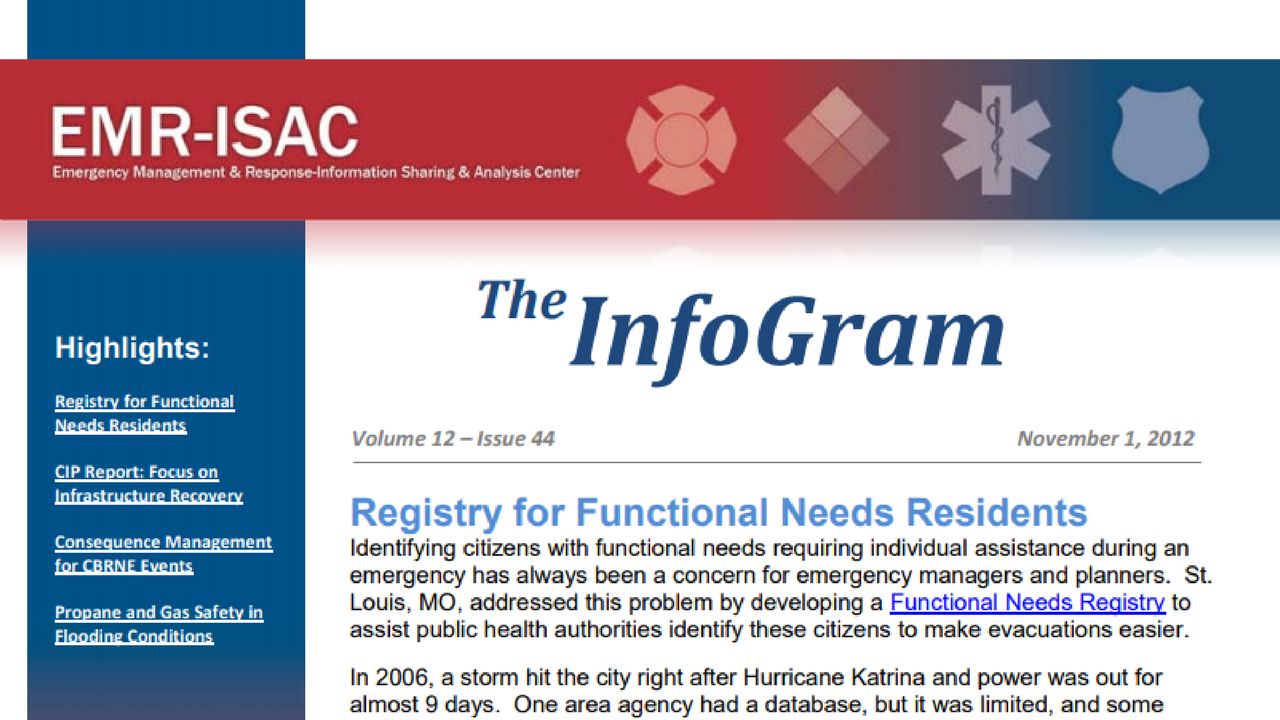Propane and Gas Safety in Flooding Conditions: EMR-ISAC InfoGram, Nov. 2012

Responding to a gas leak during average conditions is one thing, but responding during a flood or in the aftermath of a hurricane can bring an entirely different set of variables. The following include tips, resources, and things to consider if responding to natural gas and propane leaks or possible leaks during such conditions:
- Both propane and natural gas smell similar to rotten eggs, but each has a distinctively different odor. All first responders should know these smells.
- Be aware of hissing sounds, any confined areas of dead or dying vegetation, or water or dirt spraying or bubbling from the ground.
- Propane tanks can float if broken away from their anchor or pipe systems. Don’t be surprised if emergency calls come in for tanks floating away.
- Be aware that small grill or torch bottles can easily be hidden in debris.
- When approaching a propane tank, don’t assume the resident has shut off the gas. To shut the main gas supply valve on the tank, turn it clockwise.
- Propane is heavier than air, but lighter than water. If there is a propane leak, the propane will pool in the lowest part of the structure.
- Natural gas is lighter than air and will dissipate rapidly. If the leak is inside, this will increase the levels and make combustion more likely.
(Source: Propane Education & Research Council (PERC))
- Topics:
-
Transport Water
-
Transport Pipeline
-
Natural Disasters
-
Large-Scale Response
-
Hazmat
ClickToAddCategories
Select categories
No categories have been created yet.
1_Featured
Featured - The Latest in Washington
Featured Active Shooter Toolkit
Featured Blog
Featured Communications & Technology
Featured Conf & Events
Featured Data & Technology
Featured Department Administration
Featured EMS
Featured FDX Blog
Featured FDX home
Featured FDX Resource
Featured Fire Prevention
Featured Grant News
Featured Hazmat
Featured HFC home
Featured HFC Training & Resources
Featured HFC Transport & Commods
Featured Home (IAFC)
Featured Hurricanes
Featured iChiefs
Featured iChiefs List
Featured Large Scale Response
Featured Latest (IAFC)
Featured Leadership
Featured Learn & Develop
Featured Learn & Develop Courses & Training
Featured Legislative News
Featured Lithium Battery
Featured Opioid, Stimulant & Substance Abuse
Featured PDC Reading Recommendations
Featured Personnel
Featured Press Releases
Featured Research
Featured Safety & Health
Featured Smart Alarm Choices
Featured Tools & Topics
Featured Traffic Safety
Featured Volunteer & Workforce Solutions
Featured Wildfire
Featured Fire Adapted
Featured Resilient Landscapes
Featured Supression
Featured Wildland Policy
Featured WS A-RIT
featured-vws-a-rit
2_Topics
Active Shooter
Communications
Frequency Coordination
Interoperability
Narrowbanding
Public Safety Broadband Network
Data & Technology
Department Administration
Community Relations
Customer Service
Marketing & Media
Politics
Crisis Communication
Data & Analysis
Economic Environment
Finance
Budgeting
Fundraising
Legal Issues
Human Resources
Insurance
Recruitment2
Retention2
Volunteer/Career Relations
Information Technology
LODD, PSOB & Ceremonies
Strategic Planning
Strategy
EMS
Epidemics/Emerging Diseases
COVID-19
Fire-based & Private EMS
Firefighter Rehab
Fire Prevention
(Lightweight) Construction
Alarms and Detectors
Building Codes
Extinguishers
Fire Inspections
Low Frequency Alarms
Public Education
Sprinklers
Government Relations
Affordable Care Act
Executive Orders
Grants
State Legislation, Regulations
Hazmat
Lithium Battery
Transport Air
Transport Highway
Transport Pipeline
Transport Rail
Transport Water
Human Relations
IAFC Info/News
Awards
Membership
Positions
IAFC Partnerships
Govt
Industry
Organizational
Large-Scale Response
Homeland Security/Terrorism
Mutual Aid
Natural Disasters
Hurricanes
National
state: Florida
state: Georgia
state: Louisiana
state: Mississippi
state: North Carolina
state: South Carolina
state: Texas
state: Virginia
Leadership
Ethics
Generational Differences
Leadership Styles
Motivating People
Learn & Develop
Education
Mentoring
Professional Development
Training, Capabilities & Competencies
Operations
Fire Behavior
Tech Rescue
Technology
UAS
Personnel
Insurance
Labor/Management Relations
Legal Issues
Recruitment2
Retention2
Volunteer/Career Relations
Protected content
Research
Safety & Health
Health
Safety
Wellness
Traffic Safety
Volunteer & Workforce Solutions
Recruitment
Retention
Wildfire
Fire-Adapted
Policy
Resilient Landscapes
Suppression
3_Groups
Bugle ptnr 3
Bugle ptnr 4
Bugle ptnr 5
Cardiac TK org supporters
COVID Vaccine Comments
Election Committee>FAQs
FDX
HFC LEPC
Professional Development Committee
Leadership
Management
Other
Professional Development
Self Help
Project - Whole Community
Project ALERT
Project FSTAR
Project HFC
Project VWS
Project: NFIRS
Project: Opioid
Project: PERC
Project: SafeQuickClear
Section COS
Section EFO
Section EMS
Heart Safe Community Award
James O. Page Award
Section EVMS
Section FedMil
Section FLSS
Section Industrial
Section SHS
Section VCOS
Tech Council
The Latest News in Washington
USR Committee
USR Purpose
vcos17
Create a category
Done
- Resource Type:
ClickToAddCategories
Select resource types
No categories have been created yet.
1-pager/ summary/ infographic
Article
Book
Case study
Code/ regulation/ advisory
Field operating guide
Guide/ toolkit/ template
Presentation
Public education material
Reference
Report/ publication
Research
SOP/SOG
Strategy development tool
Technology
Training
Video
Webinar
Create a resource type
Done
- Organizational Author:
ClickToAddCategories
Select organizational authors
No categories have been created yet.
ALERT
Canadian Division
CDC
Communications Committee
Company Officers Section
Constitution Bylaws Resolutions Committee
Eastern Division
Elections Committee
Emergency Management Committee
Emergency Vehicle Management Section
EMS Section
Environmental Sustainability Committee
Executive Fire Officers Section
External
Fed/Mil Fire Services Section
Fire Life Safety Section
FSTAR
Great Lakes Division
Hazardous Materials Committee
Hazmat Fusion Center
Human Relations Committee
IAFC
IAFC Foundation
IAFC On Scene
Industrial Fire Safety Section
LMA
Metro Chiefs Section
Missouri Valley Division
National Safety Culture Change Initiative
Near Miss
New England Division
Policy Institute
Professional Development Committee
Program Planning Committee
Ready Set Go
RESCUES
Safety Health Survival Section
Southeastern Division
Southwestern Division
Technology Council
Terrorism and Homeland Security Committee
TIM
TReC
Volunteer Combination Officers Section
VWS
Western Division
WFI
Whole Communities
Wildland Fire Policy Committee
Create a organizational author
Done